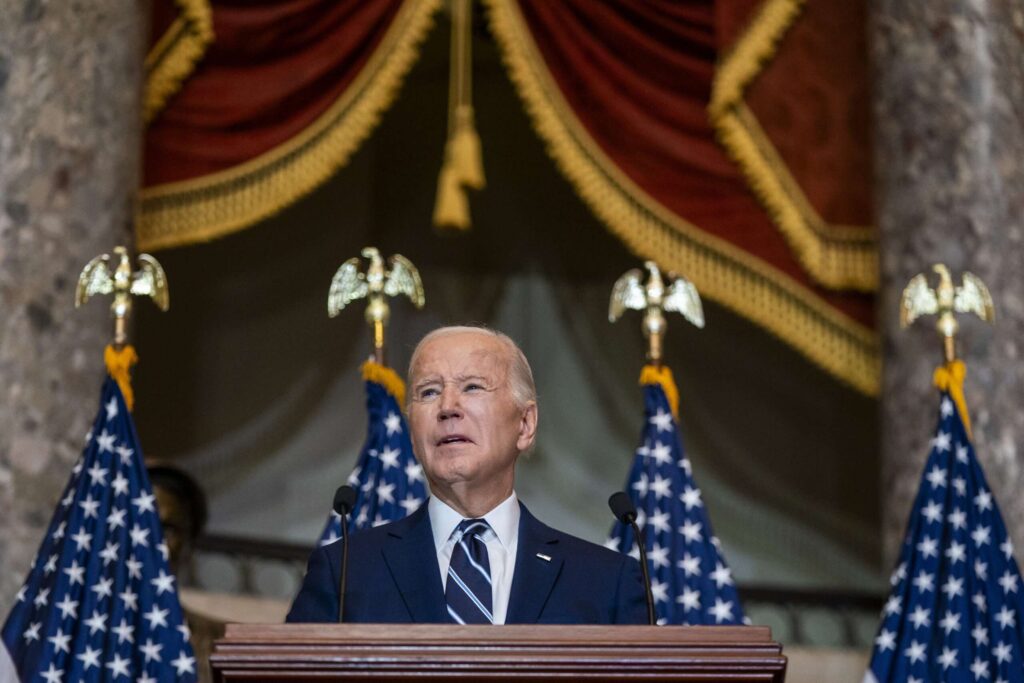
Today, President Biden announced a policy to grant “parole” to undocumented immigrant spouses of U.S. citizens who have lived in the United States for at least 10 years and meet certain other criteria. Those who meet the criteria can apply for parole status. If they obtain the permit, they will have a three-year period during which they will receive a work permit and can apply
“Green Card” permanent residency (a status that will eventually also enable them to apply for citizenship). Spouses of U.S. citizens are currently eligible to apply for a green card. But if they enter the United States illegally, they need to meet stringent conditions, such as leaving the United States first and staying in the United States for up to ten years. About 500,000 people are likely to benefit from the scheme.
Granting parole would exempt them from these requirements. Under Section 245 of the Immigration and Nationality Act, undocumented immigrants who are paroled can adjust their status to temporary legal residents. The change would waive various penalties for illegal entry, including the requirement to be absent from the United States for an extended period of time before applying for a green card.
The ethical and policy reasons for this step are obvious. Granting legal residency to spouses of U.S. citizens keeps families intact and enables these individuals to work legally. The latter will benefit their families and the broader U.S. economy. Allowing them to obtain green cards for years without leaving the country also helps prevent cruel family separations. This has clear benefits for immigrants, themselves, their U.S. citizen spouses, and their children (who are also U.S. citizens). Don’t take my word for it! Take social conservatives, who for decades have insisted (rightly) that intact families are good for children and the wider community. If you believe in “family values” you have good reason to support the government’s new policy.
Some would argue that we must always strictly enforce every law, so it would be wrong to give any reprieve to illegal immigrants. But if you truly believe that all offenders should be punished, then you must also insist that it is wrong to allow impunity for the millions of Americans who routinely commit minor traffic violations or violate Various other laws that are rarely enforced against most people. A “fair enforcement” approach would require authorities to punish most adult Americans, since most of us have violated federal criminal law (not to mention state and local laws and regulations) at some point.
If, on the other hand, you believe that it is reasonable to waive punishment where imposing it would cause great harm or injustice, or where doing so would divert law enforcement resources from more important priorities, then there is a good case to be made Give undocumented immigrants a reprieve as they flee horrific poverty and oppression. Their case for leniency is actually stronger than that of those who commit minor speeding, marijuana possession, or other crimes that most Americans would be happy to see go unpunished in most cases. This reasoning would be even more applicable if an immigrant’s probation would significantly benefit their U.S. citizen spouses and children.
The legal questions raised by Biden’s new policies are more complicated than the ethical ones. Relevant regulations empower the president to grant parole “for urgent humanitarian reasons or significant public interests, on a case-by-case basis,” entitlement non-citizens to temporary legal residence.
Biden had earlier offered parole under the law to Ukrainians fleeing the Russian invasion and to immigrants suffering oppression and violence from four Latin American countries: Cuba, Nicaragua, Venezuela and Haiti, the “CNVH” countries. A coalition of 20 red state governments filed a lawsuit challenging the legality of the CNVH plan. In March, federal District Judge Drew Tipton — a conservative judge appointed by Trump who states chose to sit on the court because they hoped he would be sympathetic to their causes — ruled that the states lacked standing to bring the case. The ruling is currently under appeal.
As in the CNVH case, there is a strong argument that parole for a U.S. citizen spouse is supported by “urgent humanitarian reasons.” Deporting these people (or requiring them to leave the country for years to qualify for legal residency) would cause serious harm to their families, including many children. There is also strong evidence that the granting of such parole creates a “significant public benefit”. As already noted, keeping the family intact benefits the larger community as well as the family itself. Again, don’t take my word for it! Take pro-family social conservatives (and social scientists across many political spectrums).
If conservative red states challenge the new policy in court, as they likely will, they may focus on the requirement to grant parole only on a “case-by-case basis” and claim the government’s rules are too clear. This issue arose in the CNVH case, and I discussed it in detail in my amicus brief in that case (filed on behalf of the Cato Institute and MedGlobal and myself) (pp. 11-20). I think most of the points made there also apply to parole for citizen spouses. I summarized the most important points in an article in September 2023 HILL:
[A]Decisions in any specific situation must be guided by rules and assumptions if they are not completely random and arbitrary. It is entirely reasonable to surmise that immigrants from countries with brutal governments, rampant violence, and economic crises have urgent humanitarian needs.
The same assumption was made that paroleing people from these countries would reduce pressure on the southern border, and it did. [thereby creating a significant public benefit]…
Likewise, it is reasonable to assume that families have an “urgent humanitarian need” to be reunited and that reuniting them is a significant public good.
Notably, parole has been used to protect spouses of U.S. service members from deportation since 2007 (a policy begun under Republican President George W. Bush’s administration). This policy also relies on general rules and assumptions: Keeping military families intact is a humanitarian imperative and it creates significant public benefits.
Like the CNVH case, legal challenges to Biden’s new in-place parole policy will raise long-standing questions. There are some obvious similarities in the statehood issues in the two cases, but there may also be some differences. My own view is that states should have broad standing rights to challenge a variety of federal policies, including those that I believe should be upheld on the merits (such as this one). But in recent years, the Supreme Court and some lower federal courts have taken a tougher stance on statehood, including some challenges to immigration policies. I may have more to say about the long-standing issue once the case challenging the policy is actually filed.
All in all, this is good policy and is authorized by the parole authority Congress has given the executive branch. But it will almost certainly be challenged in court, in what could be a drawn-out legal battle.

